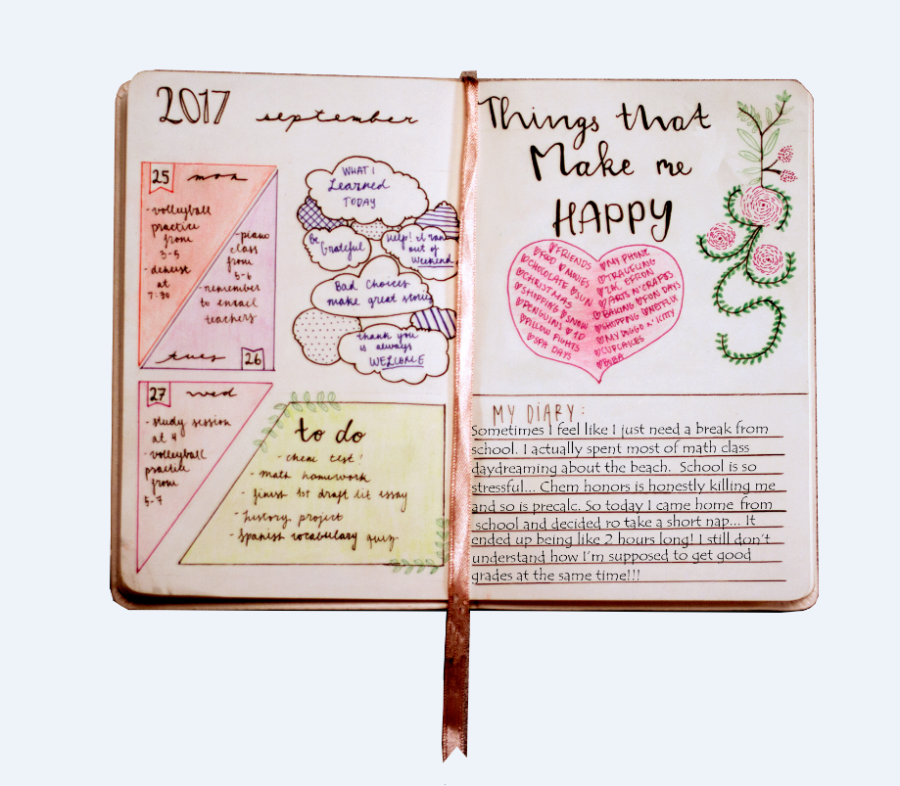Discovering the realms of journaling
A look into the distinctive effects of journaling on the mind.
September 28, 2017
While the phrase “dear diary” is one of the first things that people associate with journaling, in reality, the hobby encompasses much more. Journaling is about looking beyond events that have occurred and moving toward the experiences and feelings beneath them. Journals can be used as tools to discover oneself by reflecting on various experiences and releasing pent-up emotions.
Unlike a diary, which is a record of a person’s daily activities, a journal is more personal and can be used to examine an individual’s life. A journal can describe anything from one’s feelings in a particular situation to thoughts about political events. Journals are meant to collect ideas, experiences and observations and put them into writing.
“Journaling is not about writing something everyday like ‘I ate cheese for lunch today,’” said junior Emily Leung. “It’s about writing things that I want to look back at and think about how it impacted me in a certain way.”
The wide variety of types of journals ensure that there is something suited for everyone’s interests. Some of the most popular are daily journals, bullet journals, travel journals, dream journals and gratitude journals. Each type or journal is different from the other and focuses on a different aspect of life. Daily journals are everyday accounts of one’s feelings and experiences while travel journals are a way to log one’s various journeys around the world. Dreams can be recorded and analyzed with a dream journal, while a gratitude journal is a method of showing things for which one is grateful for and focusing on positive things in one’s life. A bullet journal’s can be used to organize one’s to-do list and jot down ideas.
“The multifunctionality of bullet journaling really appealed to me as it was essentially a journal, a planner and an agenda all in one” said sophomore Audrey Ding who has been bullet journaling for three months. “Bullet journaling helped me organize all my tasks and plan out each day. I also thought it was very cool and minimalistic.”
Journaling has been proven to have many health benefits. A study conducted by psychologists Gerardo Ramirez and Sian L. Beilock at the University of Chicago found that students who wrote about their feelings before a test performed better than those who did not. The reason behind this was that they felt less anxious, which demonstrates that expressive writing can benefit one’s mental well-being. Similarly, James Pennebaker, a psychologist and researcher at the University of Texas at Austin, found through multiple studies that daily journaling strengthened one’s T-lymphocytes, a type of cell that aids in the body’s immune response.
Aside from the clinical benefits, journaling also helps one destress. Daily journaling in particular allows one to fully express his or her emotions, without the fear of someone else’s judgement. This ability to reduce stress has even been compared to yoga and meditation, as they are all stress relievers and allow one to find a sense of calmness. Journaling assists one to take a step back and look at things from a different point of view.
“When people engage in deep breathing, like with meditation, it makes changes in the brain and its response,” said Estupinian. “The brain learns how to relax. The same applies to journaling, when you learn how to organize your thoughts in a different way, you create new neuron pathways and your brain gets really good at learning how to organize information.”
As one of the oldest methods of self-help, journaling can relieve problems and concerns, making it easier to identify stressors and find ways to avoid them. Problems are usually solved with an analytical, left-brained perspective, but sometimes it is more effective to look at things from a more creative, intuitive and right-brained perspective in order to solve them, which is used during journaling. Thus, journaling allows one to access different skills that they normally would not use.
“Journaling helps prioritize what’s important and what’s not,” said Estupinian. “What’s nice about journaling is that when you write it down on paper you can see what’s a real emergency versus what’s not that big of a priority.”
It is important to note, however, that journaling does come with drawbacks, especially for perfectionists who like to make sure that their handwriting is flawless or that their thoughts are meticulously organized.
“Since I focused a lot on the aesthetic aspect of journaling, I spent too much time pre-planning my entries and trying to make my journal look nice that I stopped journaling altogether,” said Ding.
Focusing on the aesthetics of the journal or on the quality of writing can often distract from the opportunity to unload thoughts in order to destress and unwind.
For some, it may not be the fear of staying up all night trying to perfect a single journal entry that is stopping them from journaling, but instead the time and effort that journaling seems to require. The amount of time spent is variable, however, as even spending a few minutes per day journaling is effective in unloading emotions and relieving stress.
“A lot of times people feel that to get a benefit out of meditation they have to work for an hour to feel better, but we know that’s not true,” said Estupinian. “You could just focus on breathing for 5 to 10 minutes a day and it could have an impact of your health. The same is true with journaling, even taking a little time just to reflect on your day can be extremely useful.”
Another drawback to journaling occurs when people begin to think about how they are going to record a certain event in their day instead of actually experiencing it. This leads to one not taking in what has gone in during the day and becoming a passive observer of life.
“The reason for this passiveness could be the loss of the objective,”said Estupinian. “It’s really important to be aware of the purpose of the journaling.”
Although journaling can sometimes feel tedious or time consuming, its numerous benefits outweigh the drawbacks. From alleviating stress to improving the immune system, journaling can be an activity to pick up whenever one needs to take a step back and observe all that’s going on around them.






























































Kim Avery • Jan 16, 2020 at 1:28 pm
This is such a helpful, informative article about journaling! Thank you!!